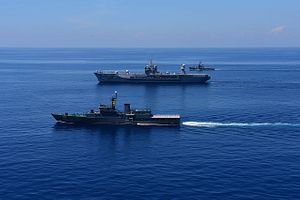The Galle Dialogue is an annual international maritime conference jointly hosted by the Sri Lankan Ministry of Defense and Navy. Last month, the seventh iteration of the Galle Dialogue focused on the theme of ‘Fostering Strategic Maritime Partnerships.’ With speakers ranging from top-echelon naval officers to eminent strategic analysts, it is but one of several forums enabling dialogue and exchanges on maritime security within the Indo-Pacific.
Strategically located at a key midpoint for trade and as a major logistics hub for naval and coastguard visits from around the world, the potential for Sri Lanka’s role in regional maritime affairs knows no bounds. At present, the Colombo Port handles 70 percent of container transhipment in the Indian Ocean, and over the past two years, 95 foreign warships from around the world have visited the island’s ports. Moreover, its Navy’s experience in fighting maritime terrorism against the lethal Sea Tigers remains an invaluable asset to the region.
With India and China coming foremost in the island’s foreign policymaking calculations, remarks made by Admiral Sunil Lamba, the chief of staff of the Indian Navy, and Rear Admiral Wang Dazhong, assistant to Chief of Staff to the PLA Navy (PLAN), warrant particular attention. The former reiterated PM Modi’s commitment to SAGAR (Security and Growth for All in the Region) and friendship with regional littorals as per its “neighborhood first policy.” In his closing remarks, Admiral Lamba proposed development of regional architectures for maritime security cooperation under the umbrella of the Indian Ocean Naval Symposium (IONS). While such remarks indicate the practicality of utilizing existing cooperation mechanisms such as IONS, they can also be argued to reveal the aspirations of India for cooperative mechanisms within the Indian Ocean Region to be under its very own auspices.
Meanwhile, Rear Admiral Wang emphasized China’s active advocacy and practice of maritime security centered on common security, comprehensive security, cooperative security, and sustainable security, illustrating this commitment by the role played by the PLAN in providing escort for ships in the piracy-ridden Gulf of Aden; for HADR and S&R missions; and for naval exchanges. In 2016 alone, the PLAN has received more than 310 ships from 38 countries and sent nearly 200 ships to visit 83 countries.
On the Maritime Silk Road (MSR) of the 21st Century, Rear Admiral Wang reiterated the government’s position on it being designed to utilize the connectivity and convenience of the oceans, and to bring together the fast-growing economy of China with the developmental interests of countries along this “road.” Concerns by regional and extra-regional states on the MSR bring to the table the discussion on the role of “outsiders” in local seas, and to what extent economics and security can be delineated for states who decide to jump on the broader Belt and Road Initiative (BRI) express.
One of the speakers referred to an important policy alternative of ‘cautious engagement’ being advocated by some analysts in response to the MSR initiative, as the “best way of finding out what the project actually means, to ensure that the economics make sense and that as much as possible the dependencies go both ways in a manner which makes it more difficult for any of the parties to exploit them strategically.”
The Dialogue also revealed the improving diplomatic and security ties with Western nations that have been in motion since the Sirisena-Wickremasinghe administration came into power in 2015. For instance, Admiral Harry Harris, Commander of the U.S. Pacific Command, mentioned that 2016 had witnessed the first port visits by four U.S. Navy ships, following a brief hiatus since 2011.
Another important development flagged during the Dialogue was the gradual process of integration of the Indian and Pacific Oceans in an operational and commercial sense, if not necessarily the strategic sense. An illustration made to this end was how commercial maritime infrastructure, such as a port terminal constructed by a State A in State B would facilitate State C’s trade with the rest of the world. Moreover, the high stakes of industry stakeholders in the safety and security of the SLOCs within the region have driven them to establish or contribute to multilateral initiatives and strategies to counter maritime security threats, effectively shaping a more comprehensive, whole-of-government response.
While examples of information sharing arrangements, confidence building mechanisms (CBMs), and sustainable capacity building assistance within the Indo-Pacific are numerous and ongoing, their importance continues to be heightened by the changing geopolitical landscape characterized by increasingly nationalistic netizens and personality-driven politics. The resulting insecurities however may lead to a proliferation of initiatives rather than augmentation of current mechanisms, in the interests of appearing to be doing something rather than getting something done.
While the existing spider’s web of security relationships and economic co-dependencies within the region informally do amount to a structure of containment of potential conflict, their increasing complexity also means that some states may be prepared to gamble with a few of these relationships. While forums such as the Galle Dialogue strive to inculcate a culture of cooperation and dialogue, only time (and conflict) will tell the true capability of such mechanisms in deterrence and dispute management.
Rajni Gamage is a Senior Analyst from the Maritime Security Programme, Institute of Defence and Strategic Studies, S. Rajaratnam School of International Studies, Nanyang Technological University, Singapore.

































